J-PAL Southeast Asia @10
Milestones from J-PAL Southeast Asia’s first decade
Since 2013, J-PAL SEA has established itself as one of the main partners for evidence generation in Indonesia. Within a decade, J-PAL SEA has achieved many significant milestones, from providing evidence to improve the delivery and expansion of Indonesia’s food assistance program to informing the rollout strategy of a cash transfer program during Covid-19. Additionally, J-PAL SEA has also launched the Inclusive Financial Innovation Initiative to support the Government of Indonesia’s priority to promote digital financial inclusion.

2013
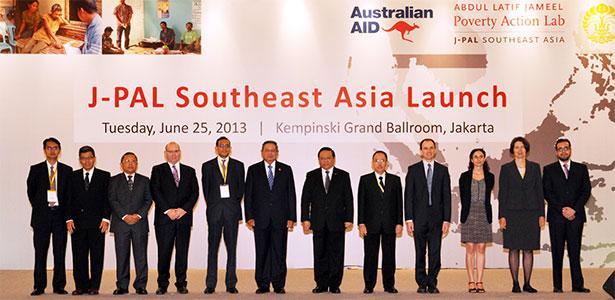
J-PAL Southeast Asia Office Launch
Photo: J-PAL
Southeast Asia (SEA) Office Launch
On June 25, 2013, J-PAL opens its SEA office in Jakarta, Indonesia, with the mission to reduce poverty in the region by translating rigorous research into action. The J-PAL SEA office is based in the University of Indonesia, Faculty of Economic and Business (Lembaga Penyelidikan Ekonomi dan Masyarakat – Fakultas Ekonomi dan Bisnis Universitas Indonesia/LPEM FEB UI) and became J-PAL’s fifth regional office, joining J-PAL’s offices at top universities in Latin America, Europe, South Asia, and South Africa.
Informing Indonesia's largest food assistance program
In 2012, the Government of Indonesia was considering distributing identification (ID) cards to low-income households informing them of their eligibility for a national subsidized rice program, Raskin (now known as Kartu Sembako). In 2013, the Government requests evidence on the effectiveness of the cards before rolling them out nationwide.
In response, J-PAL affiliated researchers Abhijit Banerjee (MIT), Ben Olken (MIT), and Rema Hanna (Harvard) and coauthors Jordan Kyle Cohen (International Food Policy Research Institute), and Sudarno Sumarto (SMERU Research Institute) conducts a fast, large-scale randomized evaluation to test the impact of the ID cards on the transparency and delivery of Raskin. Following the findings of the evaluation, the Government of Indonesia scales up the delivery of ID cards to 15.5 million low-income households, reaching 65.67 million people nationwide.
Informing Government of Indonesia’s decision to adopt the community targeting method
J-PAL affiliated researchers Abhijit Banerjee (MIT), Ben Olken (MIT), and Rema Hanna (Harvard) and coauthors Vivi Alatas (Asakreativita), and Julia Tobias (CDC Group) conduct a randomized evaluation to improve citizen satisfaction with the targeting process of Indonesia’s unconditional cash transfer program (Bantuan Langsung Tunai/BLT). The community targeting method leads to higher community satisfaction because the household rankings better match the community’s perception of which families should benefit from the program. In 2013, the National Team for the Acceleration of Poverty Reduction (Tim Nasional Percepatan Penanggulangan Kemiskinan/TNP2K) modifies their methods for determining eligibility for the BLT by incorporating community feedback on the beneficiary lists.
Sharing research findings on social protection
The conference brings together academics, policymakers, and representatives from government agencies, multilateral institutions, and donor agencies operating in Indonesia and Southeast Asia. The conference examines the existing evidence on critical social protection policies, identifies the key policy questions, and explores how researchers and policymakers can come together to answer them.
Local academics and leading international academics, including Suahasil Nazara (the National Team for the Acceleration of Poverty Reduction/TNP2K), Rachel Glennerster (J-PAL Global), and Michael Kremer (Harvard), present topics relating to education, health, governance, and poverty reduction. One important outcome of the conference, along with meetings with stakeholders, is the development of new project ideas, for example, the health insurance study, which tests and identifies effective ways to increase the enrollment and retention of non-poor informal workers in Indonesia’s national health insurance program (Jaminan Kesehatan Nasional/JKN).
2014
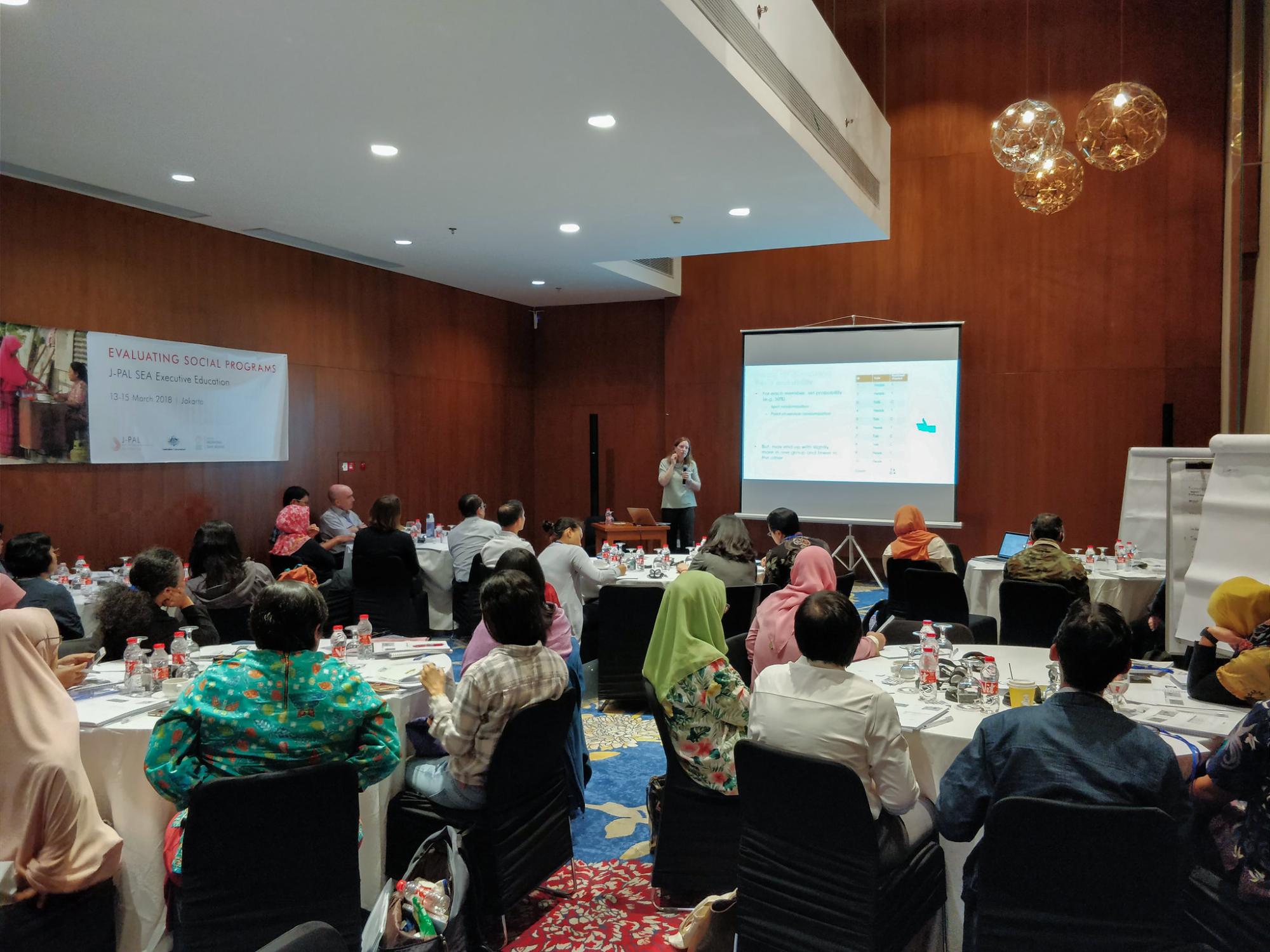
J-PAL SEA Evaluating Social Program Course
Photo: J-PAL SEA
Delivering J-PAL flagship training, Evaluating Social Programs
J-PAL SEA conducts series of training on randomized evaluation for the Australian Agency For International Development (AusAID), UI, University of Gadjah Mada (Universitas Gadjah Mada/UGM), and the National Team for the Acceleration of Poverty Reduction (TNP2K).
The training in UGM is attended by staff from the Social Security Administrator for Health (Badan Penyelenggara Jaminan Sosial Kesehatan/BPJS Kesehatan). Simultaneously, BPJS Kesehatan and J-PAL SEA are in discussions to start a study to test and identify effective ways to increase the enrollment of the national health insurance scheme (Jaminan Kesehatan Nasional/JKN) enrollment and payment among informal workers to increase healthcare coverage and improve JKN’s financial sustainability. The discussion later developed into a project.
2015
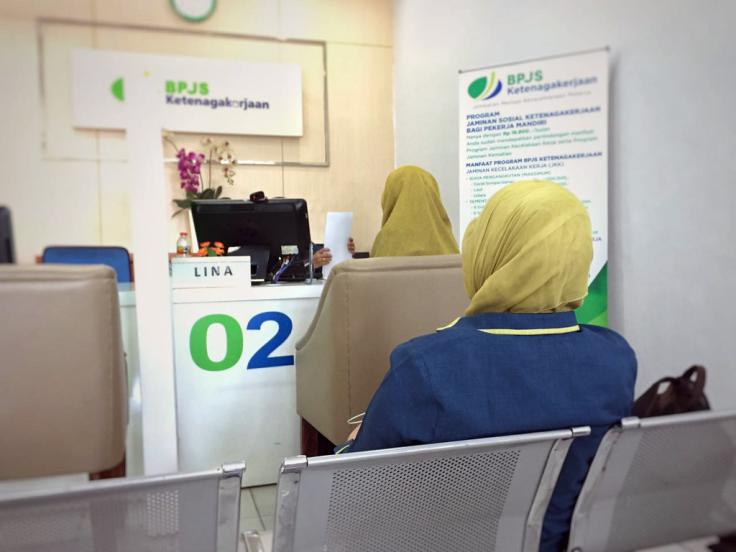
A woman is queuing to submit a claim in Indonesia’s Social Security program (BPJS TK) office.
Photo: Luqman Sumartono | J-PAL
Informing the pricing strategy of Indonesia’s national health insurance scheme
J-PAL affiliated researchers Abhijit Banerjee (MIT), Amy Finklestein (MIT), Ben Olken (MIT), and Rema Hanna (Harvard) and co-authors Sudarno Sumarto (SMERU Research Institute), and Arianna Ornaghi (Hertie School) conducts a randomized evaluation to test the impact of various programs, including subsidies, registration assistance, and information campaigns on the enrollment and retention of non-poor informal workers in Indonesia’s national health insurance scheme, Jaminan Kesehatan Nasional (JKN).
The findings from the evaluation inform the Government of Indonesia’s decision to avoid raising premiums between 2016 and 2019. However, the study's long-term results also suggest challenges in ensuring the program’s financial sustainability. In 2019, the Ministry of Finance makes the decision to increase premiums for all healthcare classes.
Leveraging evidence to improve migrant welfare and agency quality
In 2014, the issue of the abuse of female migrant workers abroad led to the protection of migrant workers becoming a policy priority for the Government of Indonesia. In response, current and former J-PAL affiliated researchers Simone Schaner (University of Southern California), Lisa Cameron (University of Melbourne), Firman Witoelar (Australian National University), Samuel Bazzi (UC San Diego) conducts a randomized evaluation to study the impact of providing migrants with information about the quality of migration agencies.
Informed by this study, the National Board For The Protection Of Indonesian Migrant Workers (previously known as Badan Nasional Penempatan dan Perlindungan Tenaga Kerja Indonesia/BP2TKI and now Badan Perlindungan Pekerja Migran Indonesia/BP2MI) develops a quality ranking system for placement agencies that match international migrants with an employer. Moreover, J-PAL SEA also provides field findings to the BP2MI team which is used to improve their pre-departure orientation for migrant workers, intercultural awareness, and knowledge about required immigration documents and procedures.
2016
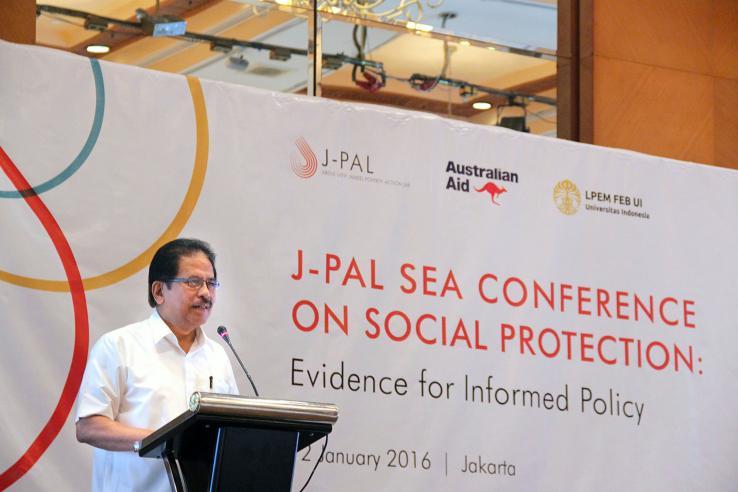
Sofyan Djalil, Indonesia’s Minister of National Development Planning, at J-PAL's conference in Jakarta
Photo: J-PAL
Convening a second social protection conference
Following our first conference in 2013, J-PAL SEA hosts its second social protection conference in 2016. Over 200 policymakers, researchers, donors, and civil society members are gathering to discuss what has worked and how to further improve social protection in Indonesia and Southeast Asia. The conference is helping open new relationships with public and private partners alike, including Bank Indonesia (Indonesia’s central bank), Mandiri Institute, and Jakarta’s Development Planning Agency (Badan Perencana Pembangunan Daerah Provinsi DKI Jakarta/Bappeda DKI). Topics range from designing transfers for social protection to targeting and delivering social protection, and the impact of cash transfers on labor supply.
2017

Car with Grab advertisement.
Photo: Lano Lan | Shutterstock.com
Sharing evidence of solutions to Jakarta’s traffic problem
In 2016, Jakarta was estimated to lose US $3 billion per year due to traffic congestion. Government partners in Jakarta invited J-PAL affiliated researchers Ben Olken (MIT), Rema Hanna (Harvard) and Gabriel Kreindler (Harvard) to present the results of their study on the “three-in-one” high-occupancy vehicle (HOV) policy, which find that the implementation of such a policy can greatly improve traffic conditions. While Jakarta’s Transportation Agency (Dinas Perhubungan DKI Jakarta/ Dishub DKI Jakarta) is ultimately deciding to implement an odd-even policy, J-PAL SEA is contributing to discussions by prompting government partners to consider relevant evidence before making a policy decision.
Expanding J-PAL SEA training and education activities to Banda Aceh and Makassar
J-PAL SEA is conducting a three-day training titled “Evaluating Social Policies” in Banda Aceh and Makassar. The trainings are attended by local policymakers, researchers, lecturers, and members of civil society and NGOs. Based on participants’ feedback, the vast majority are expressing satisfaction with the course and that the training is significantly influencing how they interact with evaluation and data.
2018
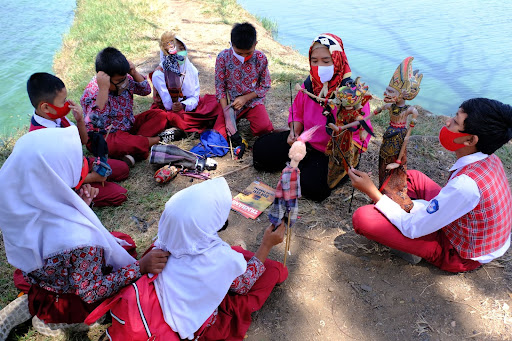
Elementary school students studying outdoors.
Photo: Bastian AS | Shutterstock.com
Measuring the long-term impact of the national conditional cash transfer program
Six years after the introduction of the Family Hope Program (Program Keluarga Harapan/PKH), Indonesia’s conditional cash transfer program, J-PAL affiliated researchers Ben Olken (MIT) and Rema Hanna (Harvard) and co-authors Nur Cahyadi (National Team for Acceleration of Poverty Reduction/TNP2K), Rizal Adi Prima (Royal Melbourne Institute of Technology), Elan Satriawan (Universitas Gadjah Mada) and Ekki Syamsulhakim (TNP2K) is finding positive impacts of the program on health and education outcomes—including reductions in stunting, increases in rates of childbirth in the presence of trained birth attendants, and increases in school enrollment.
Informed in part by this study, the Government is expanding the scope of the program. From 2016 to 2020, the number of beneficiary families increased from 5.98 million to 10 million. Moreover, the range of benefits expanded as well: within the same period, the maximum transfer size increased from IDR 3,700,000 (US$240) to IDR 10,800,000 (US$700).
Sharing policy recommendations to support stunting prevention efforts
To contribute to the policy discourse on stunting prevention, J-PAL SEA and the Ministry of National Development Planning of Indonesia (Badan Perencanaan Pembangunan Nasional/Bappenas) are holding a half-day policy conference to share evidence on what programs have been effective in reducing stunting in Indonesia. In this opportunity, J-PAL SEA is sharing policy recommendations based on the results of three randomized evaluations on: PNPM Generasi (the National Community Empowerment Program— Healthy and Smart Generation), PKH, and Total Sanitation and Sanitation Marketing (TSSM). These recommendations allow J-PAL SEA to contribute to GoI’s plan to improve social protection programs in the future.
2019
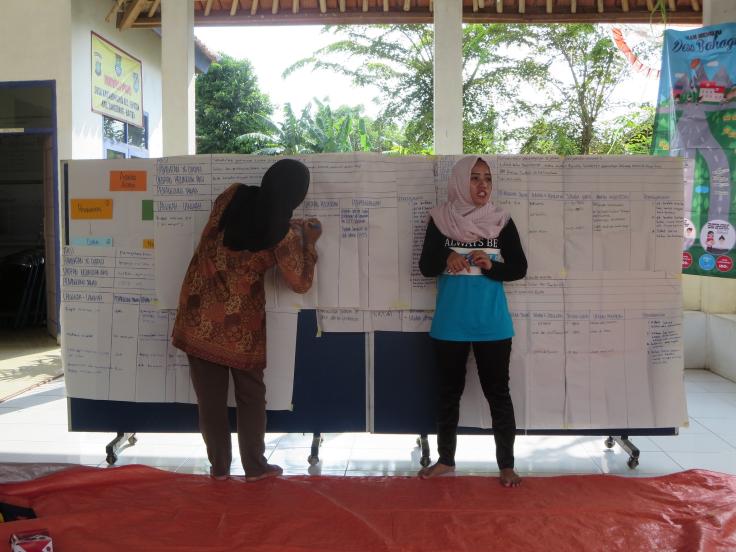
Transparency for Development project: Village discussions.
Photo: Jessica Creighton | J-PAL
Sharing evidence from the Transparency for Development (T4D) study
Between 2013 and 2018, J-PAL affiliated researcher Dan Levy (Harvard) and co-authors Jean Arkedis (Harvard), Jessica Creighton (Harvard), Akshay Dixit (Harvard), Archon Fung (Harvard), Stephen Kosack (Harvard), and Courtney Tolmie (Results for Development/R4D) conducted a randomized evaluation of the T4D program to generate lessons on how to strengthen transparency and accountability of public health systems by engaging civic participation across two countries: Indonesia and Tanzania. The authors launch the findings in an evidence-sharing session in 2019, which acts as a platform for J-PAL SEA to share the evaluation results and discuss ways to better identify and formulate effective solutions to improve the governance of public service delivery in Indonesia.
Cultivating a culture of evidence-based decision making to inform TransJakarta’s public transport management
In the process of testing innovative solutions to increase the quality of public transportation service, J-PAL SEA is supporting Jakarta’s Bus Rapid Transit (BRT) network, TransJakarta, in developing its data management system.
J-PAL SEA is working closely with TransJakarta to create an easy-to-input data management system, which uses a standardized format to structure all GPS, tap-in data, and other data TransJakarta collects. This allows the TransJakarta technical team to modify, analyze, and interpret the data. TransJakarta is now making a procedural change in how they allocate buses to routes, moving from anecdotal evidence to data-driven decisions.
Debunking the myth of the “lazy” cash transfer recipients in Indonesia
In response to commonly-held beliefs among some policymakers that cash transfer programs could cause laziness and reduce work incentives, Ben Olken (MIT) is collaborating with Elan Satriawan (National Team for Acceleration of Poverty Reduction/TNP2K) and the Institute for Economic and Social Research (LPEM) to share findings from a conditional cash transfer (CCT) study in Indonesia and other countries that find no evidence that beneficiaries are wasting their CCT money on consumptive goods or are discouraged from labor.
The effort is also supported by a number of policymakers: Vivi Yulaswati (Bappenas) and TNP2K, who are leading the advocacy efforts to improve the facilitation process of Indonesia’s CCT program, PKH.
2020
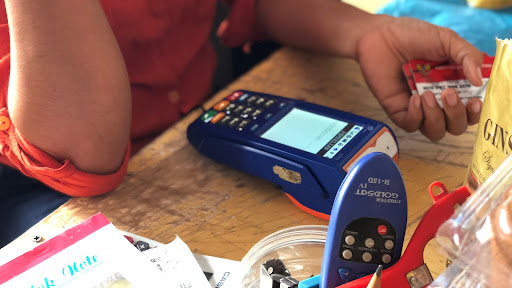
A bank agent providing a cash social assistance transaction.
Photo: Ivan Mahardika | J-PAL
Launching the Inclusive Financial Innovation Initiative
J-PAL SEA launches the Inclusive Financial Innovation Initiative (IFII) to answer important policy questions now at the forefront of the region’s economic growth. With the support of the Bill and Melinda Gates Foundation, the four-year initiative aims to ensure that digital financial services can drive economic development while lifting up women, low-income groups, and marginalized communities.
Covid-19 Response at J-PAL SEA
Similar to other countries, the Covid-19 pandemic is threatening the stability of the financial and health system of Indonesia. During this period, J-PAL SEA’s staff and affiliate researchers are moving to indirect data collection methods such as online surveys and phone interviews. We are working to provide timely evidence to support policy responses to the Covid-19 pandemic in Indonesia.
Applying evidence to identify cash transfer recipients during Covid-19
The Indonesian Ministry of the Villages, Development of Disadvantaged Region, and Transmigration is adopting community-based targeting for the rollout of its Covid-19 relief program. The decision is informed by the result of a previous study by J-PAL affiliated researchers Abhijit Banerjee (MIT), Ben Olken (MIT), and Rema Hanna (Harvard) and their co-authors Vivi Alatas (Asakreativita), Julia Tobias (CDC Group), which find that using community members to identify the poorest households to receive cash transfers greatly improves local satisfaction and leads to smoother disbursal processes. As of December 2020, the cash transfers had been distributed to nearly 75,000 villages and over eight million recipients, including 2.5 million female breadwinners who had not previously received any social safety net programs.
Following the adoption of the community targeting method in providing cash transfer assistance during Covid-19, the Government of Indonesia is including both community targeting and self-targeting in the 2021 Ministry of Social Affairs Regulation No. 3 as methods to update the social welfare database.
2021
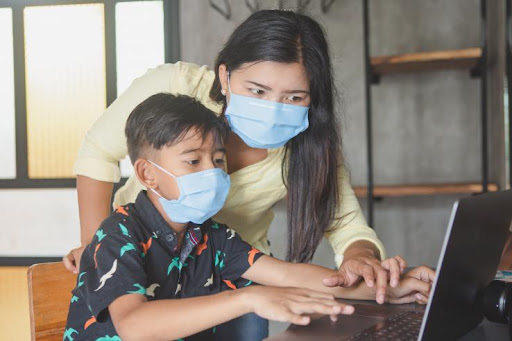
A woman teaching a young boy.
Photo: Shutterstock.com
Informing the government’s post-pandemic school reopening strategy
The Indonesian Ministry of Education, Culture, Research, and Technology is adopting several recommendations from J-PAL SEA in their operational guidelines for teachers and schools during the pandemic, including recommendations to implement periodic low-stakes assessments to identify students' learning loss, to differentiate teaching based on students' initial capability as shown in the Teaching at the Right Level pedagogy, and to provide training counselors to recognize signs of psychological pressure in both teachers and students.
J-PAL SEA is one of many organizations involved in contributing evidence to the guidelines. Read more about our exploratory study on the implementation of home learning in Jakarta and our opinion piece on the role of parental support in children’s education.
Expanding the impact evaluation workshop to Thailand
To further expand the network of Southeast Asian researchers and policymakers committed to evidence-based policy, J-PAL SEA is collaborating with Equitable Education Fund Thailand to conduct its first impact evaluation workshop for researchers, NGOs, and government staff in Thailand’s education sector.
Launching the Research Ethics Committee at the University of Indonesia
J-PAL SEA is supporting the establishment of an Institutional Review Board, the Research Ethics Committee (Komite Etik Penelitian), at LPEM FEB UI. The goal of the committee is to further promote ethical social research in Indonesia, protect the rights and welfare of human research subjects, and minimize potential risks.
To date, KEP has held several workshops and sharing sessions on research ethics, human subject certification, and the establishment of an institutional review board, which have been attended by academics, researchers, and postgraduate students. Since its inception, KEP has also seen an increase in the number of ethics approval issued for research, rising from 5 approval letters in 2021 to 40 approval letters in 2023. Overall, the growth reflects an increased awareness of the importance of research ethics in Indonesia.
Providing insights on navigating Indonesia's post-pandemic era
J-PAL SEA is hosting a public webinar titled “Navigating Indonesia’s post-pandemic era: Addressing opportunity, inequality, and growth.” Esteemed panelist H.E. Sri Mulyani Indrawati (Ministry of Finance), Abhijit Banerjee (MIT), and moderator Chatib Basri (CReco) share their insights on the need to strategically cushion the pandemic’s health and economic consequences, address Covid-19-induced inequality, and discuss what it would take for Indonesia to pursue a “green” recovery. Read the key takeaways of the event on the J-PAL blog.
Sharing evidence from research related to gender
With the goal to support the growth of the evidence base in the Indonesian gender sector, J-PAL SEA hosts a public discussion to share lessons learned from the global space on interventions to improve women’s empowerment. The session also aims to provide insights into the Government of Indonesia’s policy and programs which promote gender equality and challenge gender norms. Watch the full recording of the discussion, or read the key takeaways on J-PAL’s blog.
Informing the reform of Indonesia’s largest food assistance program
J-PAL affiliated researchers Abhijit Banerjee (MIT), Ben Olken (MIT), and Rema Hanna (Harvard) and co-authors Elan Satriawan (Universitas Gadjah Mada) and Sudarno Sumarto (SMERU Research Institute) partner with the Government of Indonesia to compare the efficacy of Rastra in-kind transfer and Non-Cash Food Assistance (Bantuan Pangan Non Tunai/BPNT) electronic vouchers. Results of the evaluation suggest that the use of vouchers has positive impacts on poverty reduction, beneficiary targeting, household consumption decisions, the quality of rice, and the administrative costs of delivering the program. Informed by the evidence, the government of Indonesia is continuing the expansion of electronic vouchers to 18.8 million households and increasing the amount to IDR 200,000 (US$13) in 2020. Watch the dissemination session or read the key takeaways on J-PAL’s blog.
Gathering evidence to strengthen Indonesia’s branchless banking agent network
J-PAL SEA’s IFII is hosting a learning collaborative webinar to share valuable findings from a randomized evaluation conducted by current and former J-PAL affiliated researchers Erika Deserranno (Northwestern University) and Firman Witoelar (Australian National University), and their co-author Gianmarco Leon-Ciliotta (Universitat Pompeu Fabra), on increasing the take-up and usage of branchless banking products.
2022
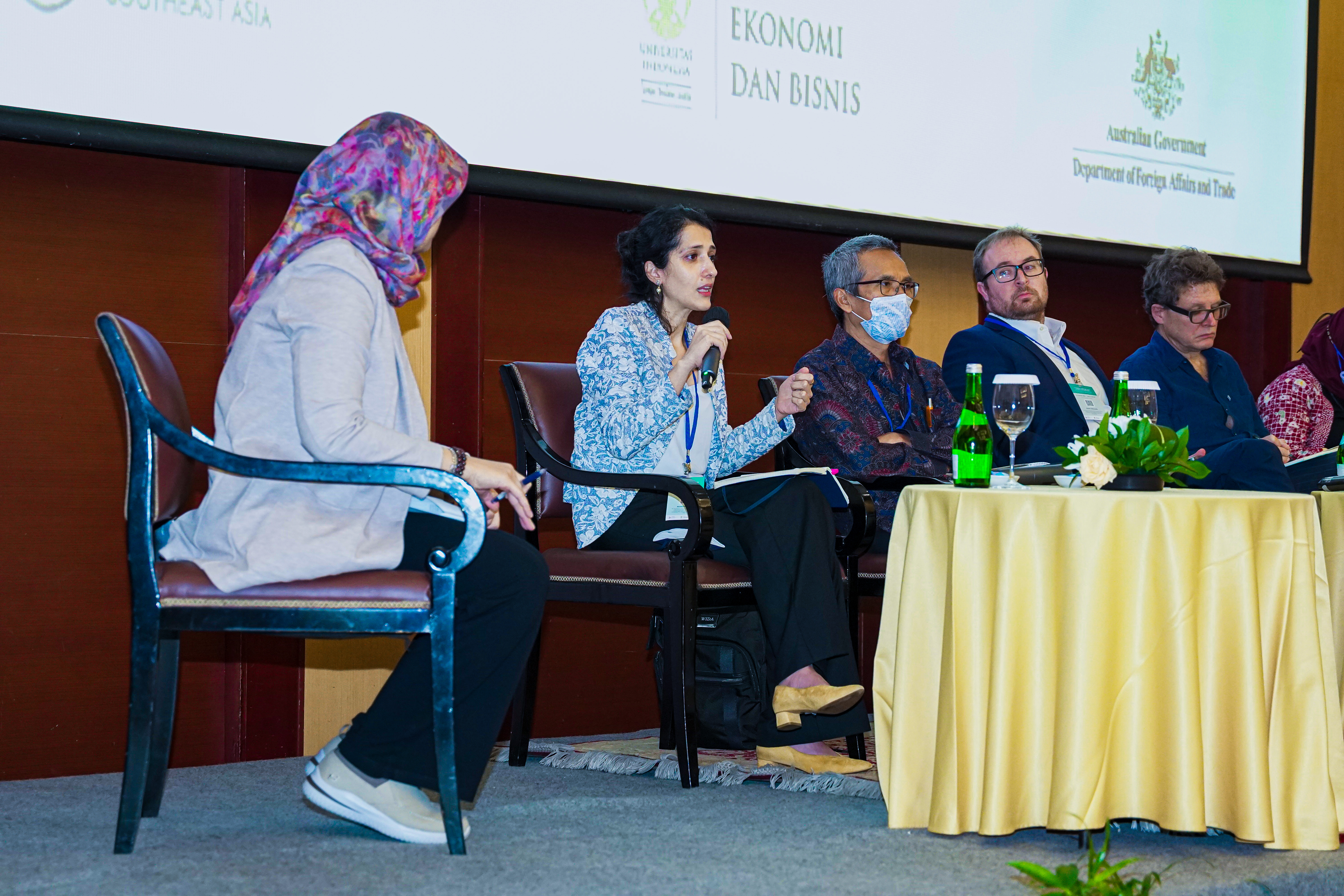
Plenary session speakers at J-PAL SEA’s environment conference
Photo: Anemone Studio
Expanding J-PAL SEA’s work on environment
J-PAL SEA is currently working to increase our project development and matchmaking effort in the environment sector. To help accomplish this, J-PAL SEA is organizing its first environment conference with the goal to share insights from rigorous evidence and provide a platform for stakeholders in the environment sector to connect and collaborate. Read the key takeaways in the recap blog post, or watch the event highlight video to hear from decision-makers and researchers who attended the conference.
Launching the Micro, Small, and Medium Enterprises (MSMEs) and Transportation Initiative
With support from the Millennium Challenge Corporation, J-PAL SEA launched its newest Initiative on the MSME and Transportation sectors. The initiative focuses on three key areas: 1) mapping out firms with high-growth potential for credit access; 2) identifying interventions to complement credit access such as capacity building or access to market, and; 3) identifying factors that make transportation of goods costly.
The goal of this initiative is to promote a knowledge-sharing partnership between researchers and policymakers by identifying open questions, synthesizing current evidence, and collaboratively defining a research agenda in the areas of MSMEs and transportation sectors.
Supporting effective research collaboration and data sharing practices
The Government of Indonesia is becoming increasingly interested in adopting a culture of data- and evidence-driven policymaking to address the needs of the nation's most vulnerable citizens. In line with this, J-PAL SEA is organizing a series of webinars that brought multiple representatives from government and institutions together to discuss the importance of updated, secure, and ethical data-sharing practices and the need to increase collaboration between researchers and policymakers for evidence-based policymaking.
Collaborating with the Knowledge Sector Initiative (KSI) to increase gender mainstreaming in research
J-PAL SEA collaborates with KSI to organize a workshop on gender-sensitive research protocols and instruments. The information that is delivered in the workshop contributes to the creation of the “Gender Equality, Disability, and Social Inclusion in Practice” publication. The publication summarizes important principles of human subject protection and ethics in every stage of the research, especially when addressing sensitive topics such as gender.
2023
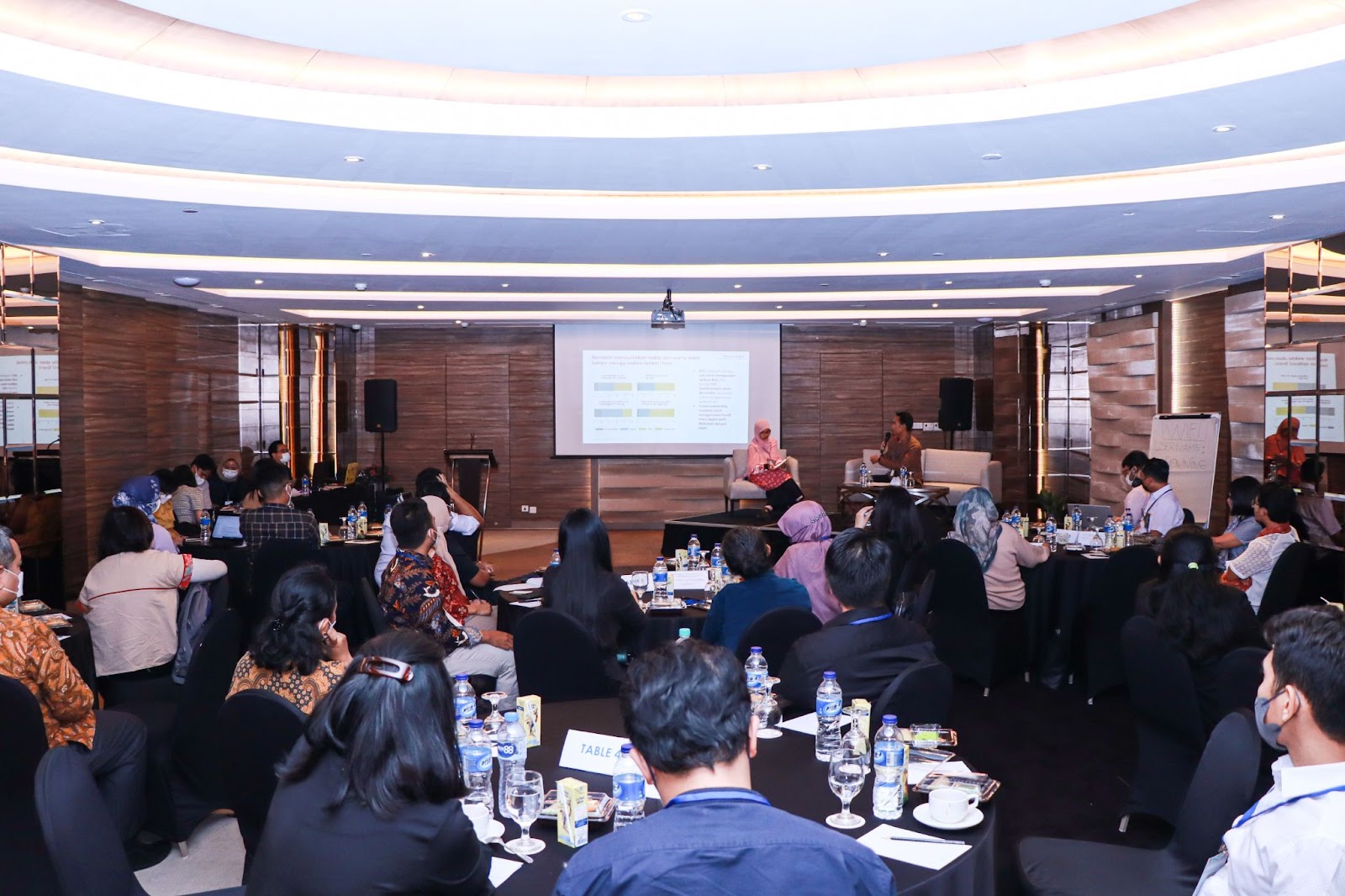
Participants at J-PAL SEA’s learning collaborative forum, Promoting Inclusive Digital and Financial Inclusion in Indonesia: Early Learnings from Pilot Studies
Photo: J-PAL SEA
Understanding the needs of the underbanked to achieve digital financial inclusion
Access to digital financial services can drive economic development by providing opportunities for those lacking access to formal financial services to conduct transactions using a digital device. In the learning collaborative session, current and former J-PAL affiliated researchers and their co-author's shares preliminary findings from a series of exploratory and pilot studies that aim to understand the competitiveness of branchless banking agents by Erika Deserranno (Northwestern University), Firman Witoelar (Australian National University), Gianmarco Leon-Ciliotta (Universitat Pompeu Fabra), Martin Kanz (World Bank), and Daniel Gottlieb (London School of Economics (LSE); women’s barriers to digital financial services adoption by Arya Gaduh (University of Arkansas) and Arief Wibisono Lubis (Universitas Indonesia); and the impact of signaling product quality on e-commerce platforms by Jie Bai (Harvard), Jing Cai (University of Maryland), Daniel Xu (Duke University), Chaikal Nuryakin (Universitas Indonesia), and Prani Sastiono (Universitas Indonesia). Read the key takeaways on the J-PAL blog.
Sharing evidence on the impact of information campaigns towards child marriage perceptions and attitudes
In 2022, J-PAL affiliated researcher Gumilang Aryo Sahadewo (Universitas Gadjah Mada) and co-author Milda Irhamni shares the preliminary findings of a randomized evaluation that examine the impact of showing a short movie to parents and teenagers about the risk of child marriage and the benefit of delaying such a practice. Results from the evaluation suggest that short movies can be an effective tool to change the attitudes and perceptions among study participants. The working paper will be released in 2023 and the end survey will be conducted in 2024.
Watch as J-PAL affiliated researchers deep dive into the study in a webinar organized by Forum Kajian Pembangunan.